Cloud Microservices Platform Market Statistics, 2031
The global cloud microservices platform market size was valued at $952.6 million in 2021, and is projected to reach $6.4 billion by 2031, growing at a CAGR of 21.2% from 2022 to 2031.
Cloud microservices platform refers to a set of tools, technologies, and cloud services that allow developers to design, deploy, and manage microservices-based applications in a cloud environment. Microservices are a software development approach where an application is broken down into smaller, independent services, each with its own set of functionalities. These services can communicate with each other using APIs and can be developed and deployed independently.

The growing adoption of cloud computing is one of the primary drivers which drive the growth of the cloud microservices platform. As more businesses move their applications and data to the cloud, they need platforms that can help them manage and scale their services effectively. Cloud microservices platforms provide businesses with the tools they need to build, deploy, and manage their cloud-based applications in a more efficient and scalable way. Cloud microservices platforms are designed to break down applications into smaller, independent services that can be deployed and scaled independently. This makes it easier for businesses to manage their applications and services, as they can focus on developing and deploying individual services rather than managing a monolithic application. Cloud microservices platforms also offer benefits such as increased agility, faster time-to-market, and reduced costs, which are all important factors driving their adoption in the market trends.
However, the security is a major concern for organizations when it comes to cloud microservices platforms market. As more data and applications are moved to the cloud, the potential risks associated with security breaches also increase. Cloud microservices platforms rely heavily on the sharing of resources, which can create vulnerabilities if not managed properly.
In addition, the distributed and decentralized nature can make it difficult to monitor and secure every aspect of the system. To address these concerns, cloud microservices platform providers need to implement strong security measures, such as encryption, access controls, and monitoring and logging mechanisms, to ensure that customer data is protected. Organizations also need to do their due diligence when selecting a cloud microservices platform market forecast provider and ensure that they have a strong track record when it comes to security.
The scalability benefits of cloud microservices platforms are significant. By breaking down complex applications into smaller, independent services, microservices architecture allows for much greater flexibility and scalability than traditional monolithic applications. With microservices, businesses can scale individual services as needed, rather than having to scale an entire application all at once. This scalability also allows businesses to respond to changes more easily in demand or usage patterns.
For example, if a particular service is experiencing a surge in traffic, it can be scaled up quickly and easily without affecting other services in the application. This can help businesses avoid downtime and ensure that their applications are always available and performing well. The scalability benefits of cloud microservices platforms can help businesses stay competitive in a fast-paced, rapidly changing market. By enabling rapid deployment and scaling of applications, microservices architecture can help businesses meet changing customer needs and stay ahead of the competition.
The key players profiled in this cloud microservices platforms market analysis report include Salesforce.com, Infosys Limited, Cisco Systems, TATA Consultancy Services Limited, Amazon Web Services Inc., IBM CORPORATION, Oracle Corporation, SAP SE, Microsoft Corporation, and F5 Networks, Inc.
The global cloud microservices platform industry is segmented on the basis of component, deployment type, application, end user, and region. By component, the market is sub-segmented into platform and services. By deployment type, the market is classified into public, private, and hybrid. By application, the market is classified into data analytics, database applications, customer relationship management, and others. By end user, the market is classified into BFSI, IT and telecommunications, government, healthcare, retail and e-commerce, manufacturing, and others. By region, the cloud microservices platform market is analyzed across North America, Europe, Asia-Pacific, and LAMEA.
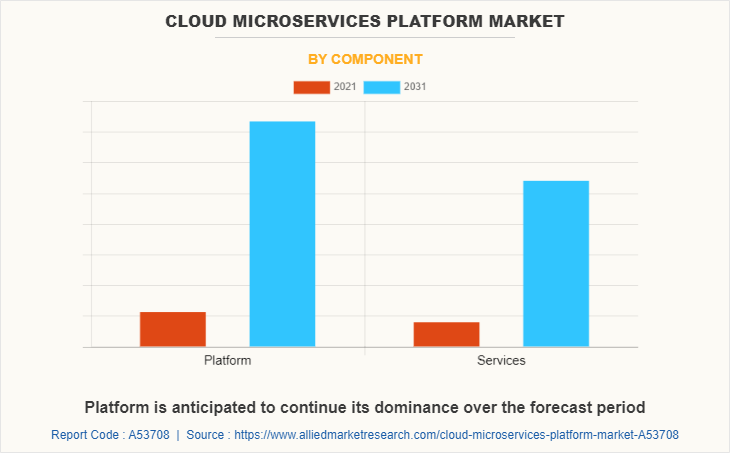
By component, the platform sub-segment dominated the market in 2021. The growing demand for agile and scalable software development and deployment solutions is driving the segment growth. Cloud microservices platforms provide a modular approach to software development and deployment, allowing developers to build, test, and deploy applications more quickly and efficiently. In addition, the rise of containerization technology, such as Docker and Kubernetes, has enabled microservices architectures to become more popular. Cloud microservices platforms often leverage containerization technology to package and deploy microservices as discrete units. These are predicted to be the major factors affecting the cloud microservices platform industry size during the forecast period.
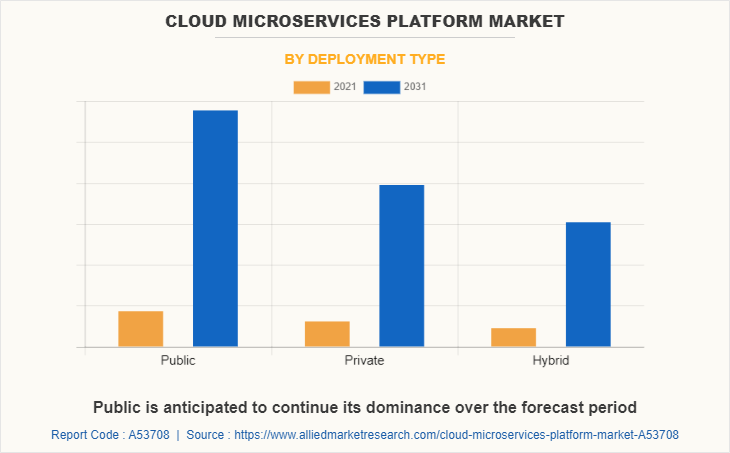
By deployment type, the public sub-segment dominated the market in 2021. The growing demand for cloud-based solutions and the increasing adoption of microservices architecture by businesses are the factors boosting the segment growth. Cloud-based solutions offer businesses greater flexibility, scalability, and cost-effectiveness compared to on-premises solutions. Microservices architecture enables businesses to build and deploy applications as a collection of small, independent services that can be scaled and updated separately, leading to faster time-to-market and more agile development processes. These are predicted to be the major factors affecting the cloud microservices market size during the forecast period.
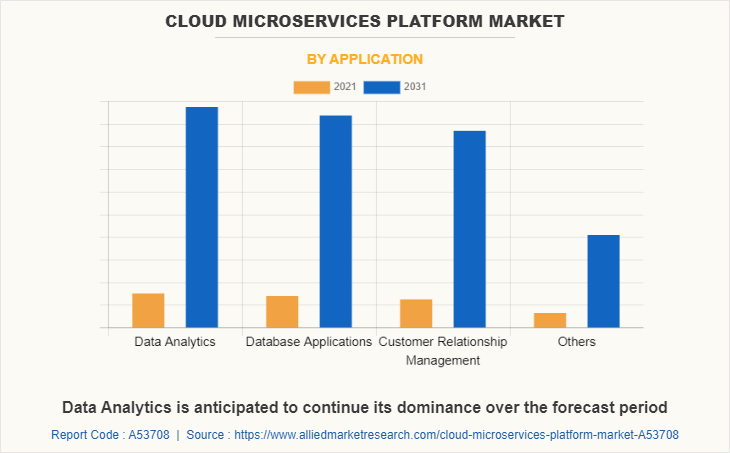
By application, the data analytics sub-segment dominated the market in 2021. The increasing need for organizations to process and analyze vast amounts of data in real-time is the factor driving the data analytics segment growth. With the proliferation of digital devices and the growth of the Internet of Things (IoT), there has been an explosion in the amount of data generated by businesses. This data can come from a variety of sources, including customer interactions, social media, sensors, and other devices. Cloud microservices platforms provide a flexible and scalable way to process and analyze large volumes of data in real-time, allowing organizations to make informed decisions quickly.
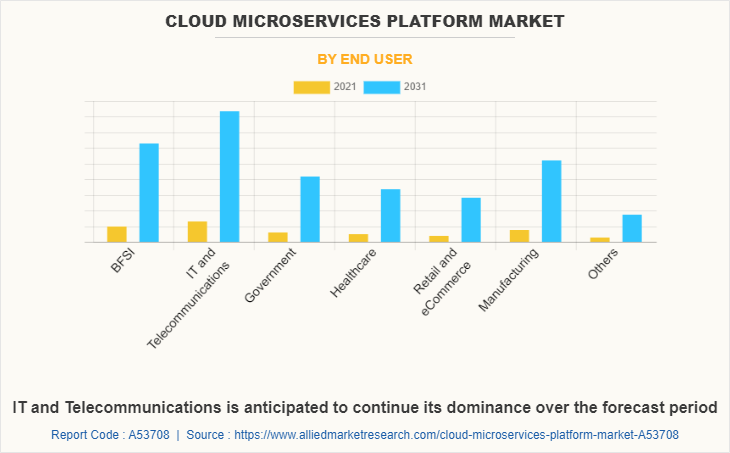
By end user, the IT and telecommunications sub-segment dominated the global cloud microservices platform market share in 2021. The segment growth is primarily driven by the increasing demand for scalable and flexible application development and deployment solutions, as well as the growing adoption of cloud computing and microservices architecture in the IT and telecommunications industry. Microservices architecture offers several benefits such as faster time-to-market, improved scalability, and better fault tolerance compared to traditional monolithic application development. This has led to an increase in demand for microservices-based application development platforms, which in turn has led to the growth of the market growth.
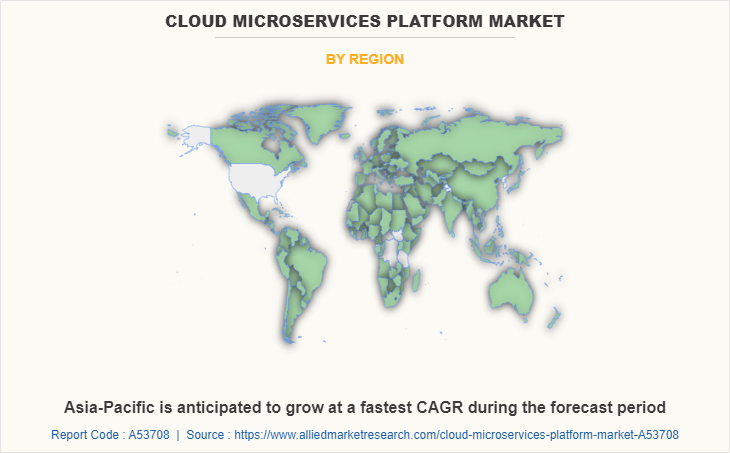
By region, Asia-Pacific is projected to have the highest CAGR during the forecast period. Cloud-based technologies are gaining popularity among businesses due to their flexibility, scalability, and cost-effectiveness. This is driving the demand for cloud microservices platforms in Asia-Pacific. Containerization is becoming an essential part of modern application development, and cloud microservices platforms are well-suited to support this trend. The region is experiencing significant growth in containerization, which is driving demand for cloud microservices platforms. DevOps practices are becoming more prevalent in Asia-Pacific, and cloud microservices platforms are an essential component of the DevOps toolchain. This is driving the demand for cloud microservices platforms in the region.
Impact of COVID-19 on the Global Industry
- The COVID-19 pandemic had a significant impact on the market. The pandemic has accelerated the adoption of cloud-based solutions and services, as more companies shifted to remote work arrangements and online business models. This has resulted in an increase in demand for cloud-based microservices platforms that can help organizations efficiently develop, deploy, and manage their applications in the cloud.
- The pandemic also highlighted the need for scalable and flexible solutions that can adapt quickly to changing business needs. Cloud microservices platforms offer these benefits by providing modular, independent services that can be easily combined and scaled as required. This has resulted in an increase in investment and development of cloud-based microservices platforms by technology providers and vendors.
- However, the pandemic also resulted in budget constraints for many organizations, leading to a slowdown in the adoption of new technologies. Some companies may also be hesitant to invest in cloud microservices platforms due to concerns around data security and privacy in the cloud in the post-pandemic period.
Key Benefits for Stakeholders
- This report provides a quantitative analysis of the market segments, current trends, estimations, and dynamics of the market analysis from 2021 to 2031 to identify the prevailing cloud microservices platform market opportunities.
- The market research is offered along with information related to key drivers, restraints, and opportunities.
- Porter's five forces analysis highlights the potency of buyers and suppliers to enable stakeholders make profit-oriented business decisions and strengthen their supplier-buyer network.
- In-depth analysis of the cloud microservices platform market segmentation assists to determine the prevailing market opportunities.
- Major countries in each region are mapped according to their revenue contribution to the global market.
- Market player positioning facilitates benchmarking and provides a clear understanding of the present position of the market players.
- The report includes the analysis of the regional as well as global cloud microservices platform market trends, key players, market segments, application areas, and market growth strategies.
Cloud Microservices Platform Market Report Highlights
| Aspects | Details |
| Market Size By 2031 | USD 6.4 billion |
| Growth Rate | CAGR of 21.2% |
| Forecast period | 2021 - 2031 |
| Report Pages | 290 |
| By Component |
|
| By Deployment Type |
|
| By Application |
|
| By End User |
|
| By Region |
|
| Key Market Players | Amazon Web Services Inc., tata consultancy services limited, infosys ltd., F5 Networks, Inc., Oracle Corporation, SAP SE, Salesforce.com, Cisco Systems, Microsoft Corporation, IBM CORPORATION |
Analyst Review
The increase in demand for DevOps practices and automation are key factors expected to drive the cloud microservices platform market growth. As businesses increasingly adopt agile development methodologies and seek to accelerate their time-to-market, DevOps practices such as continuous integration, delivery, and deployment have become essential. Cloud microservices platforms provide the necessary infrastructure and tools to support these practices, enabling organizations to automate their development and deployment processes and streamline their workflows. In addition, cloud microservices platforms offer scalability, flexibility, and resilience, which are essential in today's fast-paced, dynamic business environment. With microservices, applications are broken down into smaller, more modular components, making it easier to update and maintain them. This approach also enables businesses to quickly develop and deploy new features and functionality, which is critical in today's competitive landscape. However, the cost of adopting and implementing a cloud microservices platform can be high, particularly for small and medium-sized enterprises (SMEs) with limited budgets. This can prevent some organizations from adopting the technology, which is expected to hamper the growth of the market. Microservices architecture can help businesses improve the resilience and availability of their applications. By breaking down applications into smaller, independent services, businesses can reduce the risk of a single point of failure and improve overall system reliability. This factor is expected to create several growth opportunities for the key players operating in the market.
Among the analyzed regions, North America is expected to account for the highest revenue in the market by the end of 2031, followed by Asia Pacific, Europe, and LAMEA. Rapid industrialization and urbanization are the key factors responsible for the leading position of Asia-Pacific and North America in the global cloud microservices platform market.
Growing adoption of microservices architecture offers benefits such as flexibility, scalability, and faster deployment of applications. Microservices architecture allows for software to be developed and deployed in smaller, more flexible components, which can be scaled up or down as needed. This approach is particularly appealing for companies that need to adapt quickly to changing business needs, this factor is estimated to generate excellent opportunities in the cloud microservices platform market.
The major growth strategies adopted by cloud microservices platform market players are investment and agreement.
The report provides an extensive qualitative and quantitative analysis of the current trends and future estimations of the global cloud microservices platform market from 2021 to 2031 to determine the prevailing opportunities.
Cloud computing has become the preferred platform for many businesses because it provides scalability, agility, and cost savings. Microservices architecture is a perfect fit for cloud computing because it allows for the creation of highly distributed, scalable, and fault-tolerant applications. This factor is estimated to drive the adoption of cloud microservices platform.
IT and telecommunications sub-segment of the end user acquired the maximum share of the global cloud microservices platform market in 2021.
Asia-Pacific will provide more business opportunities for the global cloud microservices platform market in future.
Salesforce.com, Infosys ltd., Cisco Systems, TATA Consultancy Services Limited, Amazon Web Services Inc., IBM CORPORATION, Oracle Corporation, SAP SE, Microsoft Corporation, and F5 Networks, Inc. are the major players in the cloud microservices platform market
IT and telecommunications industry leaders and the healthcare sector are the major customers in the global cloud microservices platform market.
Loading Table Of Content...
Loading Research Methodology...



